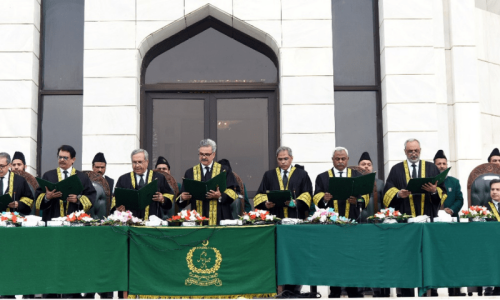Extracting oil from fruit and seeds is a practice as hold as civilisation, and oil has been used for cooking as well as for hair and skincare.
Historians have found evidence of the extraction of oil from sesame and mustard, as well as others seeds, from as far back as the Harappa civilisation, circa 2000 BC.
But the centuries-old method of extracting oil is still used in the subcontinent, albeit with some changes after the arrival of electric machinery.
Oil is most often extracted from coconuts, as well as sesame, mustard, arugula and flax seeds using an ox mill, and a kachi ghani, a cold pressing machine.
In the old days, seeds or fruit would be ground into a paste and pressed with a heavy wooden or stone mill run using bulls to extract oil. Now, these mills are run with electricity, but the wooden mortar and pestle are still in use.

Between shops in the Ganjmandi grain market, many ghani machines still extract oil from seeds and supply it to the city and neighbouring areas. The oil is sold unrefined and without preservatives, and mostly used for cooking.
As one walks towards the shops, the scent of mustard and taramira oil gets stronger.
“We have been extracting oil from seeds for 40 years. For taramira oil we use a wooden mortar and pestle because it doesn’t affect the fragrance of the oil. Machines made of steel can affect the fragrance of the oil,” Mirza Raffique Ahmed, the owner of a mill in Ganjmandi and the president of the Oil Mills Owners Association, said.
He said extracting oil is a long process, and more than 12 ghanis run simultaneously to extract oil in one hour.

In the first step, the seeds are ground into a flour and the flour is poured into a wooden mortar and pestle. Then, the machine is switched on and a worker pours water into the seed flour while the pestle moves, so that the seeds expel oil.
“Around 12 kilogrammes of oil are extracted from more than 50 kg of seeds. The leftover seed flour is not wasted, as the oil cakes left in the machines are used for animal fodder known as khal in Punjabi. These are mixed into dry fodder to make it healthier,” he added.
Mr Ahmed said khal and oil are sold separately in the market.

“Mustard oil has been used for cooking for centuries, from frying vegetables like mustard leaves and potatoes, pakoras, samosas and to make Nimko. Taramira oil is mostly used for hair care and massages, but it can also be used for cooking. To make the oil sweet it should be cooked for more than an hour and then wheat flour bread should be fried in it until it is burnt. After that the oil is ready to be used for cooking.”
He said the business has been affected by electricity loadshedding in the last few years, but it used to be that the machines would extract oil from morning until evening with short breaks.
Workers, who have to collect the oil from the wooden mortars and spray the seeds with water while they are pressed, also do hard work, he said.
Mr Ahmed said seed oil is a healthier alternative when it is extracted using the cold press method, because it is all natural.

He said: “Many customers from Rawalpindi and Islamabad opt for this kind of oil because the seeds are not heated, and the oil is extracted through the cold press method and it is pure. We do not add any chemicals and above all, it is cheap.”
Published in Dawn, January 1st, 2017













































